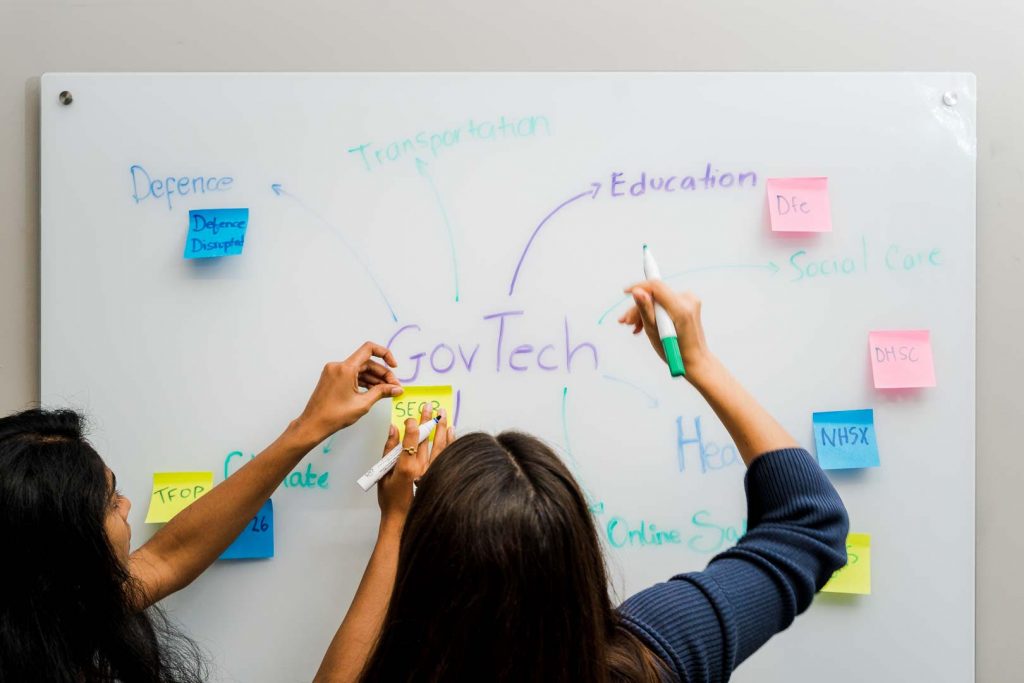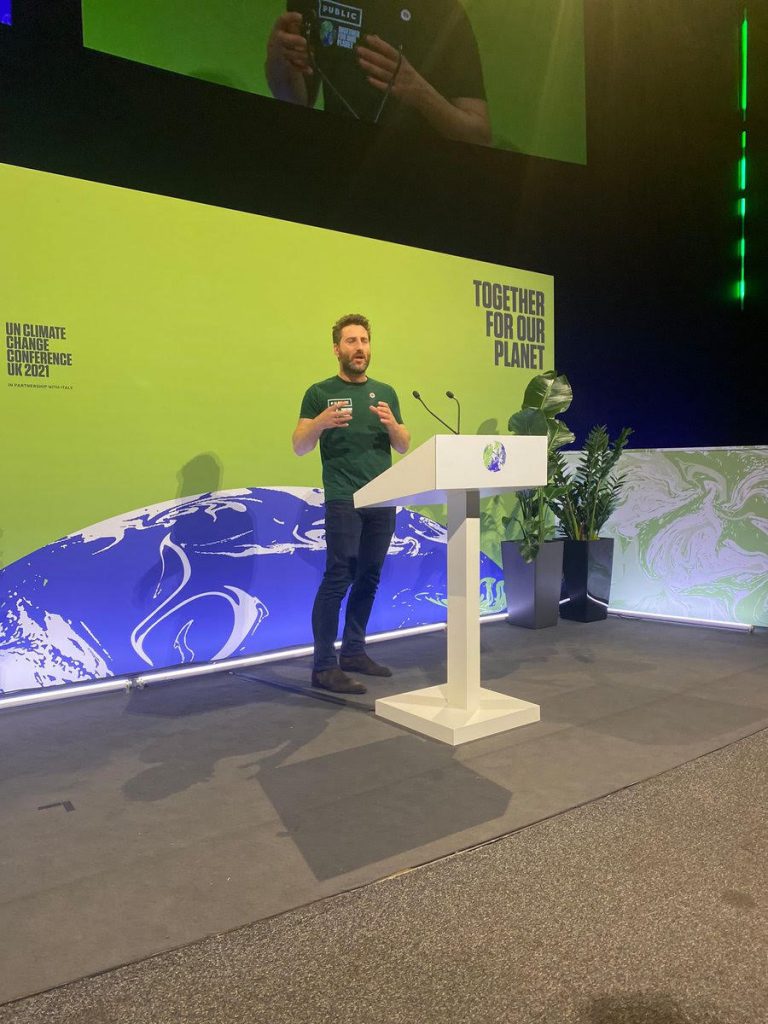The Fourth Industrial Revolution is underway. Whether you call it a new chapter for technology-driven change or the way we live and operate in society now, there’s no going back. It’s the biggest transformation in decades and is setting the tone for the future of public services in the century to come. That’s the view of Daniel Korski, CEO and co-founder of PUBLIC, a technology company that is helping to reimagine and build digitally enabled public services.

He should know, having worked for over 20 years in public policy and international relations as a special adviser in governments across the world. GovTech came onto the scene much later than other industry-disrupting phenomena, such as Fintech or AdTech. The frustration born out of seeing public services left out of progress made in technology advances led Korski, alongside co-founder and CIO, Alexander de Carvalho, to create PUBLIC. Since then, the picture looks very different, as does the company.
Starting life in 2017 as a venture capitalist investor and startup accelerator dedicated to GovTech, PUBLIC was the first of its kind, helping invest in, back and build startups to win government contracts. Jump to 2022 and PUBLIC delivers those very same contracts. In a transformative 18 months since the onset of Covid-19, PUBLIC has been called upon by the Department for Culture, Media & Sport, the Department for Business, Energy, and Industrial Strategy, the Cabinet Office, the Ministry of Justice and the Ministry of Defence, to help them solve policy problems through innovative technology.
Europe’s digital transformation
During that time, the startup has more than doubled its headcount and made its first foray into healthtech through their own portfolio company – Eva Health – a point-of-care Covid-19 vaccination platform.

Their annual GovTech Summit, hosted in London and The Hague, provided access to some of the most prominent political figures and technological leaders driving Europe’s digital transformation in the public sector.
“We’ve been working to champion the GovTech ecosystem from the start, and watching it move into the mainstream means that our vision has moved into a more promising reality,” says Korski.
“When we first started, partnerships between startups and governments were almost unheard of and seemed pretty unrealistic – but now they are a mainstay for governments and policymakers,” he says.
He points to a vast number of GovTech initiatives, programmes, and challenges launched across Europe only since 2018. FastFwd Belgium, GovTech Lab Lithuania, Spain’s IE PublicTech Lab, and France’s Achats Public Innovants to name just a few. Not to mention PUBLIC’s German HQ, where it continues to be a leading actor in the German GovTech landscape leading its first challenge-based programme with the federal state of Hesse.
“We have seen it become a major tech sector in its own right, with Covid-19 fundamentally altering the trajectory of GovTech on the continent,” he says.
“We saw it drive the digitisation agenda forward for European governments by years. The best part is, the startup solutions exist, they simply need a seat at the table.”

Citizen experience
Korski sees Covid-19 as a unique period where never before has there been such an unprecedented reliance on the startup ecosystem by the public sector. Digitising public services and using the innovative providers that have emerged in the GovTech sector has been both a significant and positive outcome from an otherwise terrible global crisis, he shares. According to him, the real question is now whether governments will seize the opportunity to embed the changes and build GovTech into one of the most important digital sectors of the economy, for the benefit of citizens who will gain access to better services.
“The private sector has totally transformed people’s expectations of what digital services can and should provide through a relentless focus on user experience,” says Korski. “Citizen experience should sit at the heart of public service design and delivery, rather than being an afterthought. That’s what GovTech today stands for – the process of making government technology more modern, intuitive and user-friendly to meet the needs of people as our society changes to become more technologically driven.
“You only have to look at Iceland, Norway or Denmark, where usage of online public services is more than 90 per cent – that citizen appetite for this quality of access is high.”
For Korski, there is still much work to be done to reach this point. While there is far more openness from public sector officials across Europe toward innovation, not enough change has been made in terms of making entry more inclusive for the startup ecosystem.
Korski’s view is if you were to ask any startup founder what the greatest obstacle they faced was when working with the public sector, the complex nature of procurement systems would crop up almost every time. The format and style of tender responses is the subject of fierce debate in the startup community, in that they can often be designed to favour large incumbent suppliers from the get-go. In a recent report by PUBLIC, 71 per cent of startups based out of Brussels stated that they find it difficult to stay up to date with public sector contracts and opportunities because it is often unclear whether their experience will make the cut.
“There is a real danger that we could end up with mountains of innovation being stifled or never seeing the light of the day,” admits Korski. But he believes there are longer term trends at play too that can be addressed. “Digital literacy in the public sector is increasingly lagging behind the private sector and without it, there is a serious constraint on the pace and success of digital transformation of public services,” he says.
“All significant projects in government now have a digital component – officials need to be equipped with an understanding of the technologies that underpin them, or those projects will be doomed from the start.”
Equipping civil servants
In September, Korski and his team launched Public School of Technology (PST), which aims to equip civil servants with the skills and knowledge required to make digital transformation a success. Overnight, their course prospectus was downloaded by civil servants in France, Peru, Canada, Brazil and countless other corners around the globe. Korski believes this surge in demand is reflective of a real shift in embracing where startup dynamics are enormously useful to learn from. In a pilot scheme, employees from the Royal Air Force and the Royal Navy were embedded with startups for 10 weeks. Through the programme, they learned methodologies, from agile working to test-and-learn and iterative approaches, quickly realising that they can’t be seen purely as beneficial through a startup lens alone. From this stems Korski’s view that what we are seeing is a readiness to ensure that public sector organisations can confidently shape their digital future and they can also adopt a pro-innovation culture.
With Europe home to some of the most innovative companies in the world, Korski argues that a much better job is needed to apply these breakthrough solutions to our greatest challenges, whether that’s reducing inequality or reaching net-zero. “If we’re truly to level up and meet our policy ambitions in the timelines set out, we need the government and wider public sector to be more tech-savvy and better versed in the dynamics of the digital economy,” he says. “Only then can a civil servant buyer recognise and harness the full value and potential of technology to transform public services, without feeling fear or scepticism.”
For him, this rings particularly true in the arena of climate action. In 2021, PUBLIC, in partnership with the Cabinet Office, took to the stage at the Cop26 climate summit with their Tech For Our Planet challenge programme. There, they convened a group of world-leading, climate-focused startups to pitch their digital technologies designed to help reach sustainability goals quicker and more effectively. From BrainBox AI, making commercial buildings manage energy smarter, to Earth Blox’s earth observation tools, and Agrisound’s sustainable agricultural systems, the talent pool available to enact meaningful change is clearly there for the taking.
“Speaking at Cop26 wasn’t something I imagined I’d ever do – not only did it mark a pivotal moment in PUBLIC’s journey but it reaffirmed just how important it is to help startups bring their innovations to global leaders, corporates and civil society,” Korski says. “It is a crucial mission of ours to ensure greentech startups are invited to play a more central role on which the agenda is set. After all, we don’t stand a chance of addressing climate change without the implementation and scaling of their technologies.”

Online safety proaction
PUBLIC has also been able to build out itself as a unique kind of technology partner to the public sector in response to policy changes, such as when the draft Online Safety Bill was released to find ways to regulate harmful online content. The company moved quickly to play a key role in the Online Safety Data Initiative, a consortium dedicated to supporting the development and testing of safety tech.
“There’s nothing complete yet out there to solve it, because it’s a really hard data problem to navigate, so it’s been a real stepping stone for us to be a core part of how we bring a standardised language and approach to this,” says Korski.
“It matters a great deal because it takes a proactive position in tackling harmful content spread online such as child sexual exploitation and abuse, hate speech and advocacy of self-harm and suicide, which often targets vulnerable individuals and threatening the security of them and our nation.”
When he talks about the future of the company, he isn’t just looking a few years ahead, but a decade on – which is a time when he hopes that policymakers, government bodies, corporates and startups will all be using PUBLIC to find the best solutions to enhance public services and improve the lives of all citizens.
“We’re growing in more than just size, but in ambition. Now we have developed a more mature and deeper understanding of government needs, we can only serve them better.”
What will govtech look like in 2022?
- Governments will start taking the online safety of citizens seriously
The emerging Safety Tech sector is one of the fastest growing parts of the UK’s technology industry, with revenues in the sector increasing by more than 40 per cent in the past year, reaching £314 million. Governments have made bold efforts to fund and encourage Safety Tech startups, notably through the Online Safety Data Initiative and the Safety Tech Challenge Fund in the UK. The next year will see governments working to find the right balance between addressing online harms without infringing on the right to privacy of users.
Startups changing the game: Cyan Forensics, SafeToNet, T3K.AI
- Procurement will go greener and be more data-driven
With climate change being high on the agenda for public as well as private sector entities, procurement will start to play a greater role in delivering and reporting on more sustainable outcomes. The European Commission’s Green Public Procurement (GPP) Strategy and the UK’s Procurement Policy Note outline a starting point to meet this transition, although seeing it through will be a central task for public procurement teams across the continent.
Climate startups: BrainBox AI, AgriSound, Earth Blox
- There will be a new wave of organisational tools for at-capacity frontline health and social care workers to deliver their services
The pandemic brought truly unprecedented demand for key workers across European economies, especially across health and social care. While we are seeing Covid-19 cases receding, we believe GovTech startups will continue to develop innovative technologies to better equip frontline health and social care workers.
Healthtech Heroes: Eva Health, Patchwork, Silo
- There will be new demands and methods for ensuring citizen trust in government using their data
Data sharing is key to effective governance and the running of public services. Data needs to be shared to drive improvements in public services and to benefit citizens. For data sharing to happen sustainably and effectively, public trust in the way data is shared and used is imperative. This is highlighted by the creation of the UK’s Centre for Data Ethics and Innovation and Germany’s Datenethikkommission, as well as the recent funding of research into data trusts and privacy enhancing technologies in Europe.


